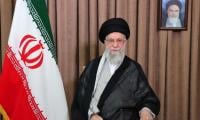The perfect heist?
Legal eye
Are they guilty or victims of propaganda? Does the evidence produced establish that the Sharifs have stolen from Pakistan or broken the law? Is the explanation presented by the Sharifs regarding ownership of the London flats believable or plausible? The answer depends on what you already believe. In the polarised environment we hang suspended in, there exists little space and appetite for objective assessment of facts. Our perceptions inform our reasoning.
“It is the spirit of law and not its form that keeps justice alive”, Earl Warren had said, probably explaining the gap between law and justice. Laws are drafted and justice systems designed with the aspiration to produce justice. But Oliver Wendell Homes Jr had acknowledged the distance between the real and the ideal and the limitation courts face when he famously declared that “this is a court of law, young man, not a court of justice.”
The Panama case is sub judice. While one can’t pass judgement we can look at and tease out competing arguments. The charge against Nawaz Sharif is three-fold: one, non-declaration of flats as an asset before the Election Commission, which ought to lead to disqualification as MNA and PM; two, non-declaration of income pointing to tax evasion, or worse, dirty money; and three, illegally sending money abroad for purchase of flats, amounting to money laundering.
What are the Sharifs and the PML-N crying about? They say NS doesn’t own any flats. His children do. They say he wasn’t named in the Panama leaks. He has only been embroiled as a parent of an owner of offshore companies. They say the offshore companies weren’t purchased in 1993 or 1995-96 as alleged but in 2006. They say no money was transferred for purchase of flats from Pakistan. And no declaration was required after the purchase as the owner/beneficiary is a UK resident.
But the PTI and other critics ask thorny questions. In what capacity were the Sharifs living in the flats since 1993? If they bought the property in 2006, whom did they buy it from and whom did they pay rent to previously? Where did the money for the purchase come from in 2006 and was declared it in tax returns? Was it sent out of Pakistan legally? Why have Sharif confidants like Chaudhry Nisar been saying that the Sharifs have had the flats for 18-20 years?
So key questions revolve around ownership of the flats, declaration of ownership, source of funds for the acquisition and money trail. The Sharif children have now presented their defence before the SC. They say their grandfather Mian Sharif set up the Gulf Steel Mill in the UAE in the 70s with the help of a loan procured from the UAE, after his business in Pakistan was nationalised. He divested his interest in this mill overtime, paid off the loans and invested AED12 million in the real-estate business of the Al Thani family of Qatar.
In 2000, after Nawaz Sharif was exiled, Mian Sharif decided that his grandson Hussain Nawaz would inherit the Al Thani investment and returns. The Al Thani family owned the London flats and had allowed the Sharifs to use them subject to the Sharifs paying ground rent and service charges for the property. In 2006, the Al Thani family and Hussain Nawaz settled their mutual accounts, and as part of the settlement bearer certificates of offshore companies that own the London flats were handed to Hussain.
The Sharif story is backed by an affidavit provided by Prince Hammad bin Jassim Al Thani (a rich businessman and former prime minister of Qatar), documents related to the Gulf Steel Mills and share certificates of the offshore companies. If it holds up, the story establishes that: (i) the Al Thani family was and the Sharifs weren’t owners of London flats till 2006; (ii) Hussain Nawaz became the owner in 2006 as nominated next-of-kin of Mian Sharif; and (iii) settlement of the investment account of Mian Sharif was the consideration and no money changed hands.
In an interview oft played by the media since the Panama leaks, Hassan Nawaz said that the flats were rented. We now see the mention of ‘ground rent and service charges’ paid by the Sharifs in the Al Thani affidavit and the response filed by Sharif siblings. As no money was paid to the Al Thani family, there is no money trail to be established and no laundered money to be justified. The only question that remains is that of truthful declarations and valid documents.
According to the Sharif narrative, Mian Sharif took no money out of Pakistan and so breached no monetary laws. He made money abroad and kept it there. He probably didn’t declare his AED12 million investment in the Al Thani real-estate business in his wealth returns from 1980 till he lived. But that’s water under the bridge. Hussain didn’t inherit anything till 2006 and so wasn’t obliged to make any disclosures. And since 2006, he wasn’t obliged to make any declarations – being a non-resident Pakistani.
This leaves us with Maryam, who is named as beneficial owner of the offshore companies that own the flats. This is important. As a resident Pakistani she is obliged to disclose her global assets in her returns. She was also supposedly listed by NS as a dependent in 2011, which then required him to disclose her assets in his return, which if not done could make his declarations false and make him liable to be disqualified; and thus the obsessive focus on her.
Maryam says she is the trustee and not the owner of the offshore companies that own the flats. The allegation against her rests on letters in which the law firm representing the offshore companies identify her as beneficial owner to a foreign investigation agency. But to refute the allegation, the Sharifs have produced before the SC a trust deed executed by Maryam and Hussain (witnessed and verified by a London attorney in February 2006), where Maryam agrees to hold 49 shares of Coomber Group Inc on trust for Hussain.
Each piece of the Sharif story, seen in isolation, is plausible. Could Mian Sharif have invested AED12 million in the Al Thani real-estate business? People make minority co-investments on the basis of trust without written formalities all the time. Do business families settle investments and make payouts on the basis of profits and mutual understanding? Sure they do. Can grandparents nominate a favoured grandchild to inherit a particular asset or property? Yes. Are such transactions illegal or invalid if not reduced to writing? No.
Plausible or not, does the story sound truthful? That depends on what side you are on. Let’s assume the Sharifs are lying. Could they have manufactured the proofs post-Panama that they have now presented before the SC? If the Sharifs bought the London flats from the Al Thani family even back in 1993 and the Qatari prince agreed to bail them out today by providing them with a false affidavit, all they need is for the prince to stick to his guns.
All other documents could easily be prepared. Offshore companies function under a shroud of secrecy and aren’t subject to onerous filing requirements. Their owners can easily doctor internal company records, including share certificates, as they wish. The trust deed is also an internal family document. It could have been prepared and executed in 2016 so long as the attorney verifying it was willing to backdate it. But this is conjecture. And it is rooted in the assumption that the Sharifs are lying.
Presently the seller and buyer of the flats have the same story. And the legal owner/trustee and beneficial owner of the companies/flats have the same story. To convict the Sharifs their detractors will need more than moral outrage. They will need proof that compensation was paid for the flats back in the 90s, proof that funds were laundered out of Pakistan in the 90s and proof that the trust deed and share certificates submitted to the court are forged. And proof is what the SC, as a court of law, has been asking for.
Email: sattar@post.harvard.edu
The writer is a lawyer based in Islamabad.
-
 New Observatory Sends 800,000 Asteroid Alerts In One Night
New Observatory Sends 800,000 Asteroid Alerts In One Night -
 Cher’s Son Elijah Blue Allman Apprehended On Two Counts Of Assault At Elite Prep School
Cher’s Son Elijah Blue Allman Apprehended On Two Counts Of Assault At Elite Prep School -
 Beatrice, Eugenie Now Face Andrew, Sarah's ‘nightmares’: 'They're Hugely Conflicted'
Beatrice, Eugenie Now Face Andrew, Sarah's ‘nightmares’: 'They're Hugely Conflicted' -
 X Debuts Topic Filtering To Help Users Shape Their ‘For You’ Recommendations
X Debuts Topic Filtering To Help Users Shape Their ‘For You’ Recommendations -
 Scientists Built World's First Computer That Learns Like Human Brain
Scientists Built World's First Computer That Learns Like Human Brain -
 Robert Carradine’s Daughter Makes Bombshell Confession As Actor's Death Cause Confirmed
Robert Carradine’s Daughter Makes Bombshell Confession As Actor's Death Cause Confirmed -
 Beatrice, Eugenie Put On Blast: ‘Only Nitwits Wouldn’t See An Association With A Pedophile As Toxic’
Beatrice, Eugenie Put On Blast: ‘Only Nitwits Wouldn’t See An Association With A Pedophile As Toxic’ -
 OpenAI Defies Industry Pressure, Secures Guardrails Under New US Defense Department Pact
OpenAI Defies Industry Pressure, Secures Guardrails Under New US Defense Department Pact -
 'Sinners' Delroy Lindo Breaks Silence On BAFTA's Tourette’s Incident At NAACP Image Awards
'Sinners' Delroy Lindo Breaks Silence On BAFTA's Tourette’s Incident At NAACP Image Awards -
 Billy Joel Admits Cancelling Of Tour Due To Brain Disorder 'sounds A Lot Worse' Than It Is
Billy Joel Admits Cancelling Of Tour Due To Brain Disorder 'sounds A Lot Worse' Than It Is -
 US And Israeli Strikes On Iran: Everything You Need To Know
US And Israeli Strikes On Iran: Everything You Need To Know -
 US Strikes On Iran Ignite Emergency Push For Powers Legislation: Report
US Strikes On Iran Ignite Emergency Push For Powers Legislation: Report -
 Kelly Osbourne's Mom Sharon Receives 'shut Up' Call Accepting An Award For Late Hubby?
Kelly Osbourne's Mom Sharon Receives 'shut Up' Call Accepting An Award For Late Hubby? -
 Claude Overtakes ChatGPT On Apple App Store After Pentagon Dispute
Claude Overtakes ChatGPT On Apple App Store After Pentagon Dispute -
 What Happened To Ayatollah Ali Khamenei's Family During US -Israel Attack On Iran
What Happened To Ayatollah Ali Khamenei's Family During US -Israel Attack On Iran -
 BRIT Awards 2026 Winners Revealed
BRIT Awards 2026 Winners Revealed



